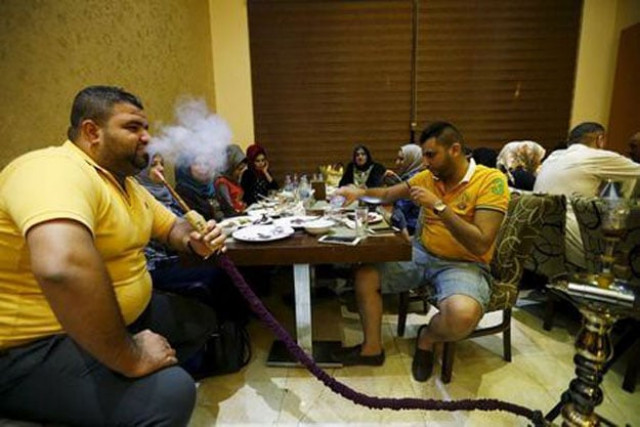In Baghdad, end of a curfew brings Ramazan joy
This is the first year that we feel the joys of Ramazan the way that we used to do in the 80s and 70s, says a customer

This is the first year that we feel the joys of Ramazan the way that we used to do in the 80s and 70s, says a customer. PHOTO: REUTERS
Smartly dressed waiters serve soup, tea and shisha pipes, while a constantly re-stocked buffet tempts customers with barbecued meats, salads, fruits and juices.
Read: Sheesha smoking increases during Ramadan in UAE
The lifting of a night-time curfew in the Iraqi capital five months ago means that, for the first time since the 2003 US-led invasion brought violence and turmoil, lavish Ramazan meals can stretch on until dawn.
While the rest of the country fragments, hardline Islamic State fighters battle the army less than 50 km away, and car bombs still regularly inflict their deadly toll across the city, people seize gratefully at any chance to enjoy life.
 PHOTO: REUTERS
PHOTO: REUTERS"This is the first year that we feel the joys of Ramazan in the way that we used to do in the 80s and 70s," said Fawziya at the Aroma Cafe, referring an era which many Baghdad residents now recall as a golden age.
Untroubled by the prospect of a day's work ahead, she sat with her relatives and in-laws, enjoying the spirit of togetherness which Ramazan is meant to foster.
"You feel overjoyed to see this because all families have been through a lot. There is no fear," she said. "We saw this in Turkey and Lebanon when we used to travel, but now it’s here as well."
Read: 5 Karachi restaurants you must visit at iftar in the last 10 days of Ramazan
Roads in the Tigris river neighbourhood of Jadriya around the cafe were filled with cars. Pedestrians walked the well-lit, tree-lined streets, enjoying the relative post-midnight cool compared to daytime temperatures near 50 degrees Celsius.
"Lifting the curfew had a huge impact... Life has sprung up suddenly," says Abbas al Taii, a 46-year-old father enjoying a meal with his family of six.
"There is life now. Baghdad loves life... Going out at night in itself is a challenge to violence," said the US resident, who chose to bring his family back to his hometown to experience Ramazan in Iraq.
Ramazan nights
While the affluence of Jadriya doesn't extend across the whole of Baghdad, Ramazan nights are special throughout the capital.
In the impoverished Shia quarter of Sadr City, children ride bikes after dark, youngsters kick footballs and men play Muhaibis, a traditional game where players have to work out which member of an opposing team is hiding a ring in their hand.
Few families have the money to go out for Sehri. Instead some raise funds to feed the poorest during the holy month.
In a smart neighbourhood west of the Tigris, shoppers fill the brightly lit Mansour mall and cinema complex. One film showing this Ramazan, Mad Max:Fury Road, portrays the mindless violence fuelled by a revolt against a despot who hoards the resources of his desert wasteland.
After long years enduring their own war and deprivations, people in Baghdad have learnt to cherish moments of stability, even if they are fragile and fleeting.
"We were thirsty for a good time like this," said Abbas's wife Um Maram. "2003 till 2015 is almost a lifetime.
"I remember the time when I was as young as my daughters, and I used to tell them of these times. Now they can live it as well. We thank God for that. We hope that this safety lasts.”



















COMMENTS
Comments are moderated and generally will be posted if they are on-topic and not abusive.
For more information, please see our Comments FAQ